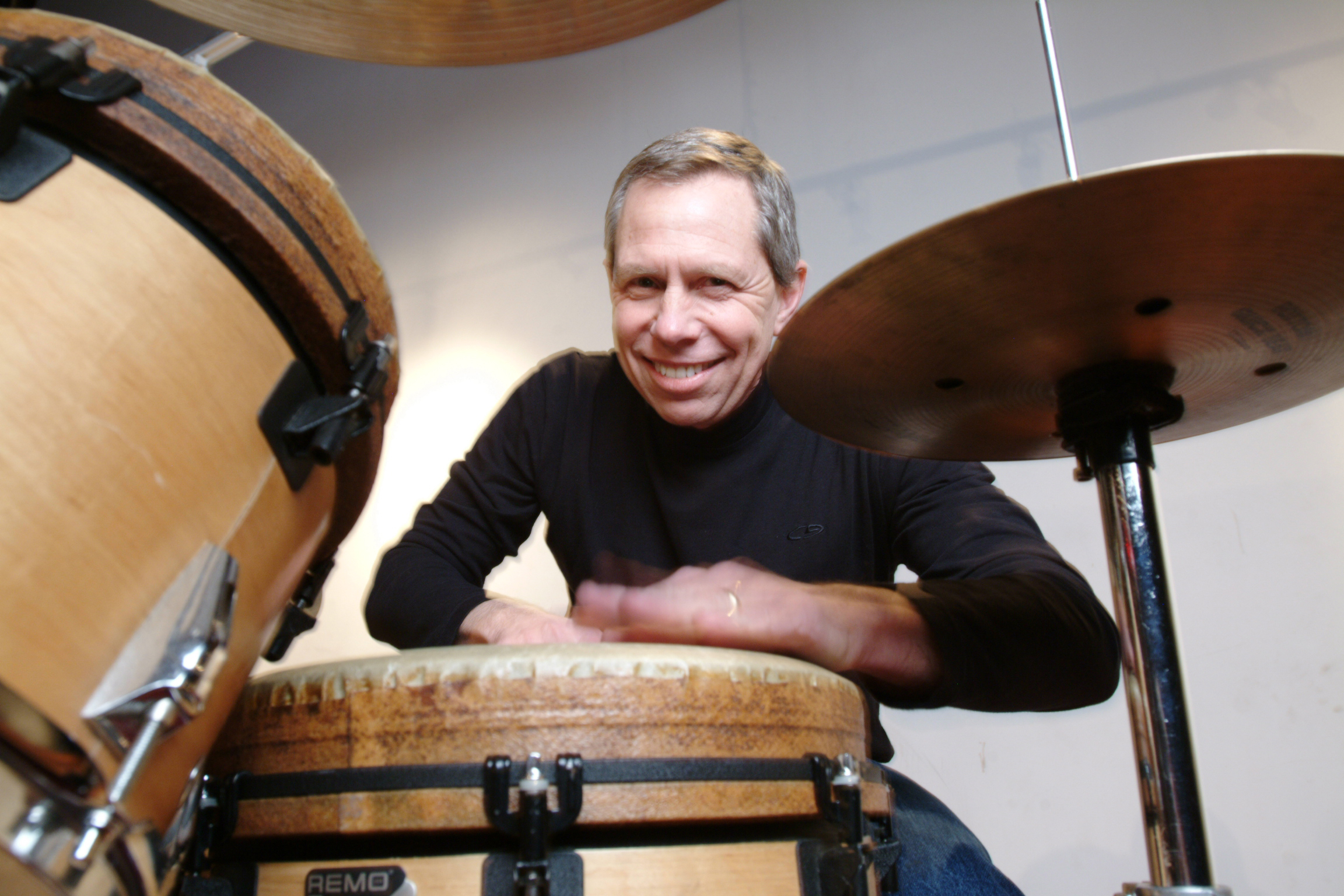If you ask percussionist Robert Jospé, everyone has rhythm.
"Everybody can play music," he said. "Rhythm is an innate quality that everybody has. Everybody can keep a simple beat. Just listen to children at play – you can hear all kinds of rhythm."
Jospé has been helping University of Virginia students get in touch with their inner groove for years. In addition to a busy performing schedule, he's been a jazz drumming instructor in the College of Arts & Sciences' McIntire Department of Music since the 1980s. For the past four years, he's also taught an innovative and popular course called "Learn to Groove" that familiarizes students from a wide variety of backgrounds with the basic rhythmic underpinnings of jazz, rock, Latin and popular music. The latest incarnation of the course will meet this summer.
Jospé also takes his message into the community. He runs a weekly program at the Albemarle-Charlottesville Regional Jail called "Rhythm and Resilience," which he also presents to the public once a month.
To varying degrees, all these efforts combine musical instruction with "mindfulness," a mental technique for stress reduction similar to meditation.
"Mindfulness is a way of enhancing our awareness of the present moment," Jospé said. "It requires you to, in a non-judgmental way, focus on the moment and focus on your senses."
In "Learn to Groove," students use hand drums and get an overview of the basic rhythmic patterns commonly used in contemporary music, from jazz to rock and Latin music .The curriculum is drawn from a book Jospé wrote – "Learn to Groove" – for drum set and hand drums and adapted for use in a classroom of 20 or more students.
"To be a complete drummer in today's world, you need to know multiple styles," Jospé said. "The course is set up to give students an overview of these different patterns and styles."
The typical class starts with some breathing exercises and a few minutes spent focused on "being in the moment," he said.
"I find that there's a great receptivity to this brief time we spend trying to de-stress," he said. "And this enhances the drumming, because music and drumming is something that requires a focus on being in the moment. You have to be not critical of yourself, and you have to be right with the beat. So the two work quite well together."
Adrianna Foster, who graduated from U.Va. in May with a degree in environmental science, took "Learn to Groove" in her final semester. A jazz vocalist, Foster said the course was her first experience playing Latin and African rhythms, and that she felt an effect on her overall musicianship.
"I do a lot of vocal soloing – scat soloing – but I've always felt that I had a bit of a problem making my solos rhythmically interesting," Foster said. "At the end of last semester, several of my other professors commented that my solos had become more rhythmically interesting, and I think that came from this class."
The mindfulness portion of class, though brief, also helped her deal with the pressures of taking a heavy course load and completing her thesis, Foster said.
Chris McElaney, another May graduate, took jazz drumming instruction from Jospé after finishing "Learn to Groove."
"The real genius of the course lies in how Professor Jospé manages to dovetail the rhythmic and the philosophical into a cohesive approach to drumming," McElaney said. "He helped me realize what I loved about percussion – and music in general – in the first place: It's all about an ecstatic immersion in the present. Professor Jospé has a huge grin on his face whenever he's banging on a drum, and the enthusiasm is contagious."
Jospé said the mindfulness aspect of his instruction is especially important when working with inmates. Phyllis Back, programs director at the Albemarle-Charlottesville Regional Jail, estimated that Jospé has made over 160 visits in recent years, and said the instruction is helpful for those who participate.
"It's an opportunity for them to participate in something they would not otherwise have the opportunity to explore," Back said. "The class also provides them with a positive role model from the community in Jos. His whole mindset has such a positive impact."
Jospé also hosts a version of the "Rhythm and Resilience" program – which he created with friend and patron Tussi Kluge – for interested community members. The next meeting is Sunday; details are available on his website.
After attending college in New York, Jospé, a Manhattan native, spent about 15 years playing professionally in the city before moving to Charlottesville. He's performed with a who's-who of musicians across a variety of genres, from rock guitarist Tim Reynolds to jazz impresarios John Scofield and Michael Brecker. He performs with the Free Bridge Quintet, the music department's faculty jazz group, leads his own group, "Inner Rhythm" and performs with many other well-known bands and artists.
In 1992, Jospé and musical partner, percussionist Kevin Davis created the World Beat Workshop, a unique presentation that traces the roots of modern rhythmic patterns from Africa to the Americas. They have presented their interactive musical, historical and geographical assembly program to thousands of students and faculty in public and private schools and universities, as well as at festivals, libraries and community centers.
In all of his endeavors, Jospé said it's important to strike the right balance between making music and staying in the right frame of mind. It's also important to remember that anybody can do it.
"People will say 'I don't have any musical talent, I don't have any rhythm,'" he said. "It's really not true. Everybody can keep a beat. Even people that have never played music, whether it's at U.Va. or the community program or in jail, even at the end of one class, we are grooving."
– by Rob Seal
Media Contact
Article Information
June 6, 2012
/content/learn-groove-jospe-keeps-beat-teaching-community-outreach

